New Teacher Survival Guide: The Parent-Teacher Conference Transcript
[0.12] Series Title Sequence:
New Teacher Survival Guide
Program Title:
The Parent Teacher Conference
SEE images of parents in the hallways of Dodd Middle School
ACT 1 : THE PARENT TEACHER CONFERENCE
Beat 1: Intro to Kazavanjian Kazavanjian
[0.10] - See sign in sheet for parent-teacher night. Parents milling around in the hallway in lines. TONIGHT, PARENT-TEACHER CONFERENCES ARE BEING HELD AT DODD MIDDLE SCHOOL, IN FREEPORT, LONG ISLAND.
See Kazavanjian setting up her classroom for parent teacher night, or Kazavanjian in the classroom alone.
LOWER THIRD (3 LINES):
KAZAVANJIAN KAZAVANJIAN
BIOLOGY TEACHER
JOHN W. DODD MIDDLE SCHOOL
FOR THIRD YEAR BIOLOGY TEACHER KAZAVANJIAN KAZAVANJIAN, THE CONFERENCES ARE AN IMPORTANT OPPORTUNITY TO CONNECT WITH PARENTS.
SEE Kazavanjian on-screen.
Kazavanjian
I have about 120 students and I see probably between 50 and 60 parents.
SEE groups of parents in the hallway. Focus on shots of parents speaking with other parents or with teachers in the hallway.
Kazavanjian: They are often having the same problems with the child at home that we are in school. That's why I think it's so important for us to have a plan of action with the parent to get some of the work done that needs to be done for them to succeed in school.
SEE Lori walk in and say hello Kazavanjian: Hi! How are you?
Lori: I'm fine, how are you?
Kazavanjian: Good to see you. Come on in, how you doing?
ONE OF THE PARENTS WHO HAS COME TO MEET WITH KAZAVANJIAN IS LORI BECKETT-MCKENZIE.
LORI HAS TWO DAUGHTERS, TONI AND NEEAH; AND KAZAVANJIAN TEACHES THEM BOTH.
SEE Lori with her daughters outside of the room.
SEE b-roll of Toni interspersed with Lori on camera
LOWER THIRD
LORI BECKETT-MCKENZIE
PARENT
Mckenzie: Toni is my 7th grader. This is her first year actually being on grade level curriculum. She doesn’t test that well, but she picked it up with her homework and her class participation, extra credit, projects, and things of that nature.
Mckenzie: My eighth grader is Neah. She’s 14. She does very well.
She needs to be challenged and pushed because she can get a little distracted sometimes and not do as well as she can do.
Kazavanjian: Come on in, have a seat. I just need you to sign in for me. Glad you are here.
Fade slowly to black Lori: Glad to be here.
Kazavanjian: I have pretty good news.
BEAT II : Kazavanjian meets with Feinstein
SEE Feinstein Feinstein walk into the school.
TO PREPARE FOR THE CONFERENCE WITH LORI, KAZAVANJIAN MET EARLIER WITH FEINSTEIN FEINSTEIN, AN EXPERT IN PARENT TEACHER RELATIONS.
Feinstein: Is there a particular issue or concern that you are thinking about right now that we can brainstorm
Kazavanjian: Yeah, I have one parent in particular. I teach two of her children, two daughters; They're both very good students. My one concern with the 7th Grade student is some of her tests. Her study skills need some improvement.
Feinstein: You mentioned that she has an older sister. Do they have a relationship where the older sister can give her a little bit more time at home with parent observing, watching?
Kazavanjian: Yeah, well it's good because the older sister is in 8th Grade so she covered all the material for 7th Grade, so she can definitely assist her with the content in 7th Grade since it is different from 8th Grade.
Feinstein: If the parent would agree that their sibling could help, that's another way of assisting her, supporting her..
Kazavanjian: We try to weave into the conversation the necessity of having parents as partners, to having them as allies, to really think about the child in the sense of a whole picture, not just the academics.
Beat 3: Back at the Conference
GRAPHIC:
SEE very brief (beat or two) wide establishing shot of Kazavanjian and Lori sitting at the front of the room.
URIE1922 AND Feinstein_KazavanjianPTR-2
Kazavanjian: Ok, start with Toni first. Ok, so she's doing pretty good. She's been doing her homework. In class, she can volunteer, she volunteers to read, she will answer questions correctly, she's really very eager, because she understands the material. The only concern I have is some of the quizzes and tests.
Kazavanjian: Neeya on the other hand, she's also doing good. She does her homework. She could study more. I'd like to see her higher than an 86 because I think she's more than capable of doing that.
Lori: She definitely is.
Kazavanjian: And, I would really like to have the girls work together.
Kazavanjian: Is there any time that's good for them, that could be set aside on a daily basis for them to work together?
McKenzie: Toni as already finished her assignments and her homework, and Neah has generally done hers also, so there is some time we can set aside.
Kazavanjian: Ok, that would be great, even if they like, do flashcards, if they like, they have Tony read to Neeh, the, you know, sheet that I sent home for the night, or vice versa, just have them take turns reading it or just help each other or test each other a little bit.
McKenzie: Ok.
Kazavanjian: I think that would be really helpful.
McKenzie: Good, glad to hear it.
Kazavanjian: Ok, thank you for coming.
McKenzie: Well thank you, you're doing a hell of a job (Laughing)
Kazavanjian: I know!
McKenzie: Definitely.
SEE Lori leaving the classroom with her children.
Act II: The Debrief
SEE shot of Kazavanjian and Feinstein reviewing the footage. See footage on screen if possible
Feinstein: So, Kim, how do you think that went?
Kazavanjian: It went rather good that conference. Both of her children do their work and study. And we discussed having them work together.
I’ve spoke to her since and they are working together, so I’m pretty happy about that.
Feinstein: That’s wonderful. What I noticed from this video was that you really were very conscious of the four steps in a successful parent conference. There was a greeting, and there’s obviously a relationship that you have established with this parent. You worked right into, in a very natural way, the successes of Toni first that you dealt with. You then gave some next steps that you thought about. Then you moved to Nia.
And you discussed again where she’s successful, where some of the challenges were and next steps for both daughters to take to improve their practice.
The tone that you set with the parent was lovely. It was very amiable between you. That was a good give and take.
SEE VIDEO OF THEM ON-SCREEN SITTING ACROSS FROM EACH OTHER
TIP: Sit on the same side of the table
Feinstein: One suggestion I do have--and if you’ll notice in the video that you’re sitting across from each other…
In the future, I would suggest that if you can move over a little bit and the parent sit over in this plot.
Kazavanjian: OK.
Feinstein: So it would be more invitational. This is very adversarial in a sense.
TIP: Give parents specifics about where their child is struggling.
Feinstein: I noticed from my notes when you spoke about Toni, your concern was the quizzes and the tests, and that she was missing two homework assignments. Could you have been more specific with the parent what those homework assignments were about? Perhaps, if we can see if there’s a pattern over time that whatever that type of homework might be that she’s having difficulty in that we might be able to zero in on why those were not done, as opposed to two home works weren’t done. Or tests and quizzes were not up to par. If we could zero in on the specifics.
TIP: Show parents examples of their children’s work
Feinstein: And I was wondering also if at times that you’ve shown specific student work to the parent as opposed to just having conversation about the test scores. Having parents giving the opportunity to hear and actually see the evidence of the work really helps them gain a greater understanding of what’s expected and for where they can move forward for next time around, which is important.
Feinstein: Thank you for the input. I appreciate all of your points. Do you have any questions that we haven’t touched upon in our conversation?
Kazavanjian: So say you're having a parent conference and the conference just is not going anywhere. The feelings are escalating and there's just, you know, no solution in sight. What are some suggestions to do then?
Feinstein: We have to remember that when parents come in, they’re carrying baggage of who they were as students also. And sometimes, it’s very hard for them to leave their history at the door.
TIP: Remain professional and suggest a follow-up meeting involving others Feinstein: You have to remain professional, stay calm, and have in the back of your mind let me jot down some of the points that you've brought up and how about we make an appointment for a next meeting in a few weeks and I would like to invite your name of your guidance counselor or the dean of your school to be part of the meeting to help work on a solution.
TIP: Invite another teacher to be present if trouble is expected Feinstein: If you're expecting some difficulty with a particular parent why don't you ask some members of your team to come and join you and let the parent know in advance that you're going to have, you know, their child's English teacher, Social Studies teacher, so we can get a bigger picture of what's happening. It's not just the focus on you and there would be other people to help support not only you, but supporting the child.
Kazavanjian: Right.
Feinstein: Kim, thank you because it really, for me, is an amazing opportunity because you have given your time and you've been so patient and kind and I do appreciate that.
Kazavanjian: Well, thank you. And I appreciate having the opportunity.
Feinstein: And good luck next year.
Kazavanjian: Thank you.
Feinstein: A new teacher has to realize that the investment in the beginning will pay off in the end. If parents see that you are open to sharing, then when the time comes and there are issues to face that might be more difficult to discuss, you have that bridge already, that you’re both there for the child. And the benefits are when the child succeeds.

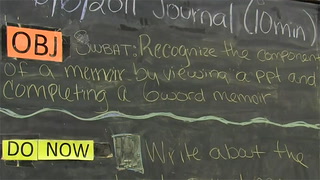
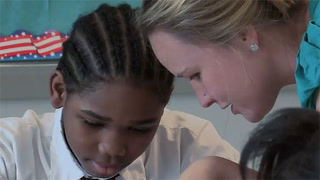
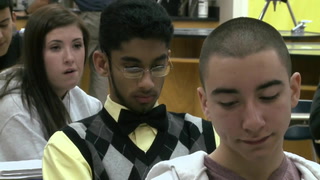
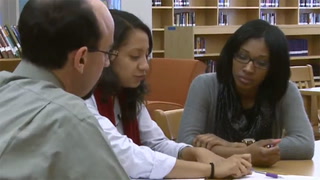
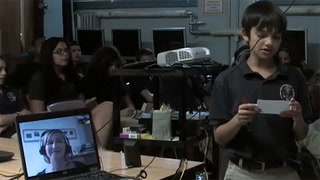
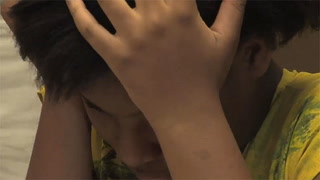
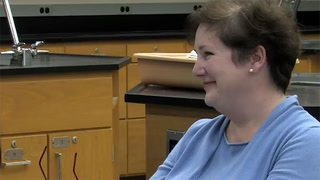
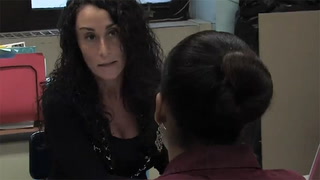








59 Comments
Lee Ann Schuette Jun 1, 2022 4:42pm
Teachers should be well prepared for the parent conferences:
Start with a welcoming greeting.
Sit on the same side of the table as the parent.
Present the parent with positive comments about what the student does well.
If the student is struggleing in one or more areas the teacher should give the parent specific suggestions of what can be done at home to help the student improve. When possible show the parent an example of a test or homework where the student is falling short.
Teacher should tell parent what the expectations are for the classroom.
Deogratias Niyonzima Sep 30, 2021 9:43am
The conference went well. The teacher was professional and the parent was a good listener. To suggest that the two sister could work together so that the 8 th grader can help her sister was a good thing that the mother suported.
Paul Kaman Sep 21, 2021 11:47am
I can't believe how much this video is framed as deficits both for the student and the parent. Its like as a parent I should be preparing for battle, incase things go wrong. Really, really problematic advice.
How about starting with "what are some specific strenghts and assests the student has" rather than only being prepared with specific struggles?
When the coach comments "some parents just can't leave their baggage [of a history of negative interactions with school systems] at the door" and "if you expect trouble, bring your crew of others?
Andrea Jones Jun 27, 2021 11:43pm
I never realized how sitting across the table creates a type of wall between teacher and parents. I'll start sitting next to my parents now